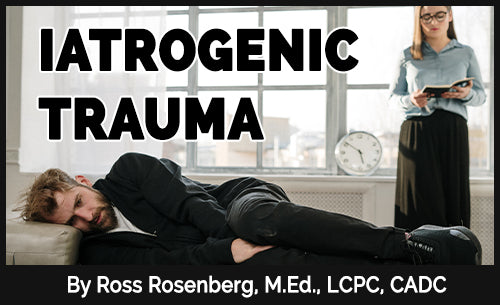
Self-Love Recovery Institute — President/CEO
Psychotherapist, Educator, Author, Expert Witness
The following is an excerpt from Ross Rosenberg's upcoming Third Edition of his Human Magnet Syndrome book, From Soulmate to Cellmate.
Iatrogenic trauma is the long-term suffering and distress caused by the poorly executed, mistaken, and/or incompetent treatment of any painful, limiting, or frightening mental health or medical problem. Such trauma is caused by a treatment provider’s unrealistic optimism, unfulfilled assurances of relief or a cure, treatment failure, the worsening of the condition, painful complications, or the creation of unanticipated unrelated conditions. Iatrogenic trauma is also caused by systematic ignorance of a medical or mental health problem, stigmatizing and shaming labels, and the lack of effective treatment.
Such iatrogenic trauma is often the result of poor judgement, laziness, and/or incompetence. Such avoidable mistakes, whether out of ignorance, accident, laziness, or willful disregard for accepted techniques, rules, and/or established guidelines, leave an indelible trauma mark on the person, which can last a lifetime.
Feeling unimportant and expendable and abandoned by the person or profession that was supposed to help, leaves a lasting, and for some permanent psychological scar. Perhaps the worst consequence is the refusal to seek life-saving mental health or medical health because of the lasting impact of this type of trauma.
The following is a historical example of iatrogenic trauma. Dr. Paul Eugen, a Swiss psychiatrist, created the term “schizophrenia” in 1911. In Latin, it translated to a person with a “split mind.” Dr. Eugen based his new schizophrenia diagnosis on his belief that such people suffered from a chronic separation of personality, thinking, memory, and perception. Dr. Eugen’s incomplete and sometimes incorrect understanding of the problem led to a wide-scale treatment protocol that provided little to no relief and, most times, made patients’ lives even more unbearable. Thankfully, current efforts to reduce stigmatizing beliefs and improve mental health care are putting pressure on the scientific community to change this diagnostic label to something less demeaning and more accurate (W. Gaebel & A. Herst, 2018).
To illustrate a possible modern example, consider a severely diabetic person scheduled for emergency surgery to amputate his left leg. Because of medical incompetence, the patient’s other leg is mistakenly amputated. When the patient wakes up and learns his “good” leg was mistakenly amputated while the dangerously infected one was left, iatrogenic trauma was experienced. It is not just the grievous mistake and the consequences to correct it that is traumatizing, but the patient’s complete loss of trust in the treatment provider and often the field in which they practice.
For codependency-specific iatrogenic trauma caused by either well-intentioned or irresponsible providers, consider how a disappointing treatment outcome could create even higher levels of loneliness, self-shaming, and harm perpetrated by their relationship partner, which, in turn, would create permanent hopelessness and beliefs of being incurable.


0 comments